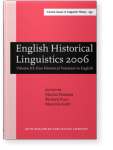The Celtic hypothesis hasn't gone away: New perspectives on old debates
The majority of scholarly opinion has long held that Celtic influence on English has been minimal on all levels of language. This is usually put down to the socially and politically inferior status of the Celts vis-à-vis their Anglo-Saxon conquerors, which then explains the small number of Celtic loanwords in English. In this article, I join the voice of those scholars who have challenged the prevailing view and called for a fresh examination of the ‘Celtic Hypothesis’. I argue, first, that the nature of the contact situation was such that linguistic influences from Celtic on English were inevitable. Secondly, the paucity of Celtic loanwords in English does not constitute evidence against contact effects at other levels of language but is the expected development. Thirdly, many features of English grammar have characteristics that cannot be satisfactorily explained as independent developments. Fourthly, the modern-era ‘Celtic Englishes’ provide yet another source of indirect evidence supporting the Celtic Hypothesis.
Cited by (3)
Cited by three other publications
ONYSKO, ALEXANDER
2016.
Language contact and world Englishes.
World Englishes 35:2
► pp. 191 ff.

OGURA, MICHIKO
2014.
WHAT REALLY HAPPENED TO IMPERSONAL CONSTRUCTIONS IN MEDIEVAL ENGLISH.
ENGLISH LINGUISTICS 31:2
► pp. 623 ff.

Benskin, Michael
2011.
Present Indicative Plural Concord in Brittonic and Early English1.
Transactions of the Philological Society 109:2
► pp. 158 ff.

This list is based on CrossRef data as of 11 august 2024. Please note that it may not be complete. Sources presented here have been supplied by the respective publishers.
Any errors therein should be reported to them.
